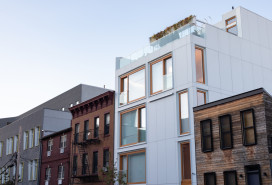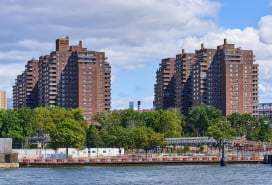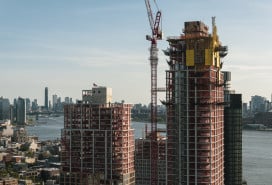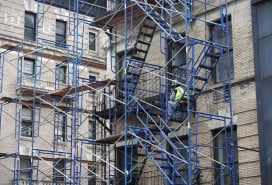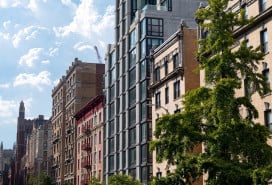Wanna get in on a pre-construction deal? Read this first

We’ve already written about the perks (and perils) involved in buying pre-construction, noting that the earlier you buy, the better deal you will probably score (unless, of course, the bottom falls out of the real estate market while you're waiting a year or two to close...or you buy a lemon).
Problem is, most properties listed on real estate sites, even listings for early-development, are past the phase when you can secure early savings. So how do you, a non-insider, get in early?
We polled some NYC real estate experts for their recommended approaches to tracking down pre-construction bargains and negotiating the best deal.
1. NYC.gov listings
The absolute first way to learn about pre-construction is through the NYC.gov website. Developers have to file their intent to build with the city so that’s the earliest information available anywhere.
You can use the database to check in on an empty lot to see which developers are filing permits to build, says Noah Rosenblatt, a real estate broker and founder of the real estate analytics website UrbanDigs, but remember that "you're looking two-to-three years or more ahead into what may ultimately hit the market," he says.
Here’s how to navigate the site:
- Go to the “Buildings Information System,” page.
- Choose option D from the “BIS Menu,” which is “Building on My Block.”
- Just type in your district number and search. A list of all planned buildings will come up. (You can find out the various district numbers on the nyc.gov website, too.)
While these lists are a helpful starting point--and show you which lots are in play--they don't offer total transparency.
"Some developers might file an LLC and you won't know who it is," says Deanna Kory of the Corcoran Group.
2. Pound the pavement
This may be the most tiring method but, hey, at least you’ll get some exercise. These neighborhoods have the most preconstruction, according to Kory.
- Gramercy
- Flatiron
- TriBeCa
- Chelsea/West Chelsea
- Long Island City, Queens
- Brooklyn
If you’re interested in a neighborhood, walk around, get the developers' information off the construction site.
You can also enter the address of a construction site into the AG’s offering plan database to find out about the site and the developer. It will even give you details on other sites that a specific developer has worked on, which will help you research the developer’s track record.
3. Work the phones
Now it's time to contact the developer directly.
"When you see a site you may be interested in, call the number on the signs or do some research to find out who the developer or marketing agent is and register with them immediately ," says Stephen G. Kliegerman, President of Halstead Property Development Marketing.
You may be told that the developer is not be ready to market the property yet, says Paul Zweben of Douglas Elliman.
Find out when to check back and mark your calendar.
4. Real estate website listings
Cold-calling can make you feel active, but until the developer is ready to market a property, it’s a dead-end.
Some developers will only speak with you when the building has a deal with a brokerage firm. A lot of the bigger brokerage firms, like Douglas Elliman, Halstead or Citi Habitats will have new development listed right on the homepage.
Brian Morgan, a broker at Citi Habitats who works on the sell-side of pre-construction, also suggests checking out the Real Deal's website, which features news about pre-construction properties. Sites like Curbed and StreetEasy's Coming Soon section in New Devs can be helpful, too.
Listings can range from buildings two-to-three years away from opening to buildings that already have several units sold (and currently selling!).
5. Specialized brokers
“Align yourself with a local broker who is knowledgeable in the market,” Morgan suggests. Brokers get all the listings and often have relationships with other brokers or with developers’ brokers, and they can help track down a specific property or help with negotiating at the end.
“You need an advisor and someone with expertise [in new construction]," says Zweben.
Having a specialized broker can cut out a lot of work for you.
"Halstead and Brown Harris Stevens brokers receive a monthly update from their development divisions informing them of all upcoming developments so those brokers know whom to contact often before any other firm," says Kliegerman.
Brokers can also give you information a particular developer's track record, and can help you come up with questions to ask when you’re buying something that hasn’t been built yet.
6. Find the best deal for you
If you buy in the first phase of construction, you can save 5-15 percent off of what the apartment will be offered at later in the process. But the "best deal" will largely depend on your point-of-view as a buyer -- some people want the penthouse or a fantastic view, which often are made available until later down the sales pipeline, when they can command the highest price.
If you're looking at the property as an investment piece, consider a unit that's "scaleable," Rosenblatt suggests. "Buy a one-bedroom with a large dining area that can easily be converted to a two-bedroom that rents or sells at a higher level."
7. Pay cash if you can--and negotiate, negotiate, negotiate
If you're an all-cash buyer--or have a big downpayment--you may have more than the usual amount of leverage at the preconstruction phase, says real estate broker Mike Akerly, who has significant experience representing condominium developers.
Why?
In the current market where new construction is in high demand, developers may be particularly aggressive with pricing, and "there may not be comparable sales to justify the prices they hope to get," says Akerly. That could lead to appraisal problems with the buyer's bank, who may only agree to lend up to a lower percentage of appraised value.
Thus developers may particularly favor all-cash buyers (who don't usually ask for an appraisal contingency) as well as buyers who can put down high down-payments if the appraisal comes in low, says Akerly, because "once these buyers close in the building, they set the new comps for future sales, thus making it easy for the developer to set a new baseline for pricing."
Your cashola leverage might be helpful in negotiating concessions, snagging a particularly desirable unit--or even negotiating on preconstruction price.
"If the comps show that the per-square-foot-price should be $850, but the developer is asking $1,000 per square foot, the developer may be thrilled with an early cash buyer who comes in at $925 because it sets the floor for future negotiations," says Akerly. "That basically erases the old $850 per-square-foot comps outside of the building and sets a new floor of $925 inside the building without worrying about appraisal issues. The developer will then hope they can build off that number for future sales."
As for concessions, they aren't as common as they used to be (see "Concession Update: What developers are giving and how to get it.") in the current market, but real estate attorney Sandor Krauss tells us he's still seeing sponsors paying transfer taxes and attorney fees. Akerly says the first place to start your negotiations is making sure you understand the fees laid out in the offering plan.
"Besides the ones most buyers have become familiar wtih--such as transfer taxes and attorneys fees--some developers will throw in interesting ones ranging from 'offering plan drafting recoupment fees' to 'creation fees' to 'oven installation fees'. No joke on the last one," he says. "These are the first places to start your negotiation."
Finally, he says, if you're not cash-rich and you're in a competitive bidding situation, keep in mind that "developers focus on their net proceeds from the sale," says Akerly.
"Instead of asking for something like a closing cost concession--which means the developer credits you for something at closing, lowering his net proceeds--consider asking him to raise the purchase price dollar-for-dollar with your closing cost request," he suggests. That way, in addition to addressing your liquidity issue, "the developer doesn't lose out and your bid stays strong."
Related posts:
How to buy preconstruction smart
The 7 most common construction defects: BrickUnderground's 2013 Update
Ask an Expert: What to do about condo common charges that are higher than advertised
Don't think about buying a new condo until you read this
Concession update: What developers are giving and how to get it
Prewar vs. new: Which is better?
Ask an expert: How do I check a developer's track record?
Confessions of a pre-construction buyer
The Haggle: A new sponsor and a big discount on a new condo

